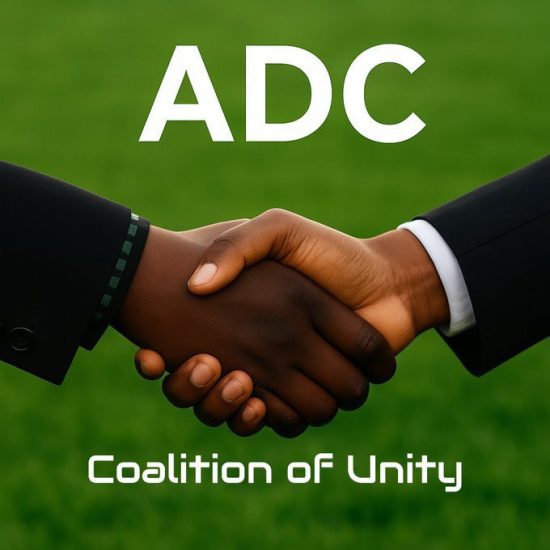Recent developments surrounding the African Democratic Congress (ADC) have stirred considerable intrigue. The announcement that the Atiku Abubakar-led coalition would adopt the ADC as its platform for the 2027 elections raises pivotal questions about the party’s autonomy and integrity. Was the ADC sold to Atiku Abubakar, or has it been seized by a coalition whose intentions remain cloaked in ambiguity?
Political parties often serve as vessels for ideologies and platforms. Yet, they are also vulnerable to the machinations of powerful individuals and coalitions. The ADC, initially conceived as a progressive alternative to Nigeria’s dominant parties, now finds itself at a crossroads. The recent unveiling of the ADC as the vehicle for the opposition—led by a coalition that includes figures such as Atiku Abubakar, Abubakar Malami, and Ireti Kingibe—raises eyebrows. The conspicuous absence of key ADC leaders, such as National Chairman Ralph Nwosu and National Secretary Alhaji Saidu, at this pivotal moment casts a shadow over the party’s ownership and direction.
In political parlance, the notion of “selling” a party implies a transfer of ownership or control, often for personal gain. Conversely, “seizing” a party suggests an aggressive takeover, typically against the will of its original leadership. The lack of representation from established ADC leaders at the coalition’s unveiling suggests a concerning power vacuum. This begs the question: have the party’s original leaders been sidelined, or have they willingly relinquished control in pursuit of a broader political agenda?
The emergence of a faction called the Concerned Stakeholders of the ADC underscores the internal discord within the party. This group’s vocal opposition to the appointment of new executives—including Rauf Aregbesola as Secretary-General—highlights the fractures that have developed as the ADC navigates this new political terrain. While factionalism is not uncommon during party transitions, the stakes in this instance are particularly high.
Factional disputes can often dilute a party’s core message and objectives. The Concerned Stakeholders’ resistance to recent appointments signals a struggle for the soul of the ADC, raising concerns about its future viability as a credible opposition party. If the ADC is perceived merely as a vehicle for Atiku Abubakar’s ambitions, it risks losing the trust of its base and the broader electorate, ultimately undermining its mission.
Leadership dynamics play a crucial role in the health of any political party. The ADC’s current predicament reflects a broader trend in Nigerian politics, where party leaders frequently navigate treacherous waters of loyalty and ambition. The apparent sidelining of established ADC figures raises serious questions about the party’s decision-making processes. Are the original leaders complicit in this transition, or have they been marginalized by a coalition that prioritizes political expediency over party integrity?
The involvement of high-profile politicians in the ADC’s unveiling may suggest a strategic alliance aimed at consolidating power against the ruling All Progressives Congress (APC). However, the question remains: at what cost? The ADC’s identity and mission risk being compromised if it becomes merely a platform for the ambitions of a select few, rather than a genuine representation of the people’s aspirations.
The unfolding drama surrounding the ADC is emblematic of the broader challenges facing opposition parties in Nigeria. The political atmosphere is often marked by disunity and fragmentation among opposition groups, which ultimately benefits the ruling party. The ADC’s struggle to maintain its identity in the face of external pressure is a microcosm of a larger issue: the urgent need for a united, principled opposition capable of effectively challenging the status quo.
The 2027 elections are poised to be a critical juncture for Nigeria, with the potential for significant political realignment. If the ADC can successfully navigate its internal crises and emerge as a credible alternative, it could yet play a pivotal role in shaping the nation’s political future. However, if the party continues to be viewed as a tool for the ambitions of a few, it risks alienating its support base and failing to galvanize the necessary momentum for a meaningful challenge to the ruling party.
In conclusion, the question of whether the African Democratic Congress was sold or seized is more than a matter of semantics; it strikes at the heart of political integrity, leadership, and the future of opposition politics in Nigeria. The absence of key ADC leaders at a moment of critical importance raises serious concerns about the party’s autonomy and direction. As factions emerge and internal disputes unfold, the ADC must urgently reassess its identity and purpose amid a rapidly evolving political landscape.
To reclaim its status as a viable opposition force, the ADC must prioritize transparency, inclusivity, and a recommitment to its founding ideals. The road ahead is fraught with uncertainty, but the potential for transformation remains. Ultimately, the future of the ADC—and the broader trajectory of Nigerian politics—will depend on its ability to navigate these complexities with integrity and vision. The stakes have never been higher, and the choices made in the coming months will echo far beyond party lines, shaping the nation’s democratic destiny.


